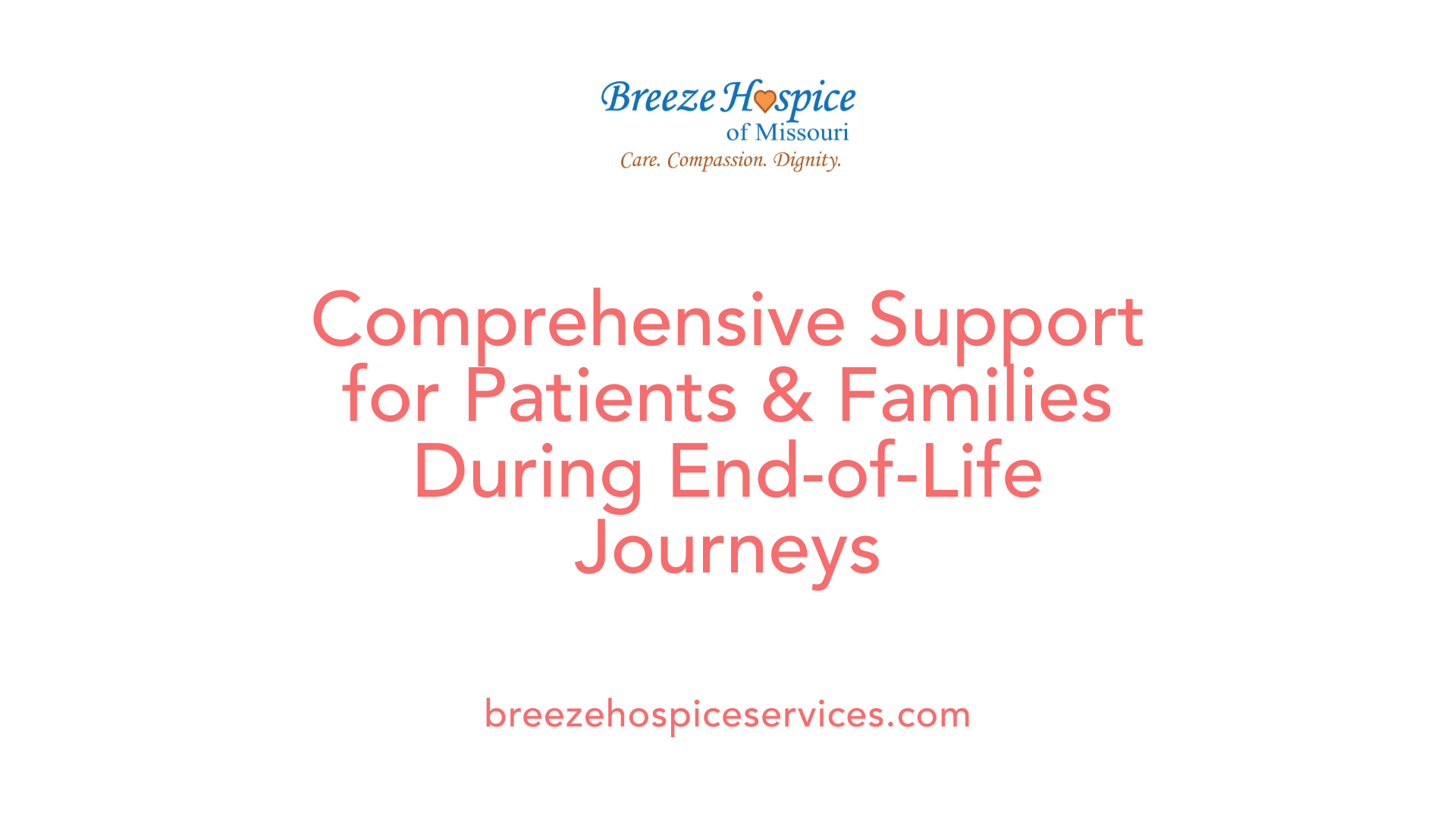How Hospice Services Provide Peace of Mind for Families
April 28, 2025
Ensuring Comfort and Dignity During Life’s Final Journey

Understanding How Hospice Brings Peace of Mind
Hospice services are dedicated to providing compassionate, comprehensive care for individuals facing life-limiting illnesses. By focusing on comfort, emotional well-being, and spiritual support, hospice aims to alleviate the physical, psychological, and practical burdens experienced by patients and their families. This article explores how hospice care supports families through expert management, holistic support, and vital communication, making the end-of-life process more peaceful and meaningful.
Key Components of Hospice Care and Their Support for Families

What are the key components of hospice care, and how do they support end-of-life families?
Hospice care is built around several essential elements designed to provide comfort, support, and dignity to patients nearing the end of their life, as well as to their families.
A central feature of hospice is the interdisciplinary team. This team typically includes physicians, nurses, social workers, chaplains, volunteers, and therapists. Together, they collaborate to deliver personalized care tailored to each patient's physical, emotional, and spiritual needs.
One of the primary components is pain and symptom management. Hospice teams focus on controlling pain and alleviating other symptoms, such as breathlessness or nausea, using medications and therapies. This ensures that patients experience as much comfort as possible.
Emotional and spiritual support is equally vital. Chaplains, counselors, and social workers provide counseling and spiritual guidance, helping patients and families cope with the emotional toll of terminal illness. This holistic approach encourages peace of mind and emotional resilience.
Guidance for families is another strong pillar. Hospice teams assist loved ones in understanding the disease progression, recognizing signs of pain or distress, and participating actively in care. Education about caregiving, ongoing communication, and practical advice foster confidence and reduce anxiety.
Bereavement and grief counseling extend support beyond death. Many programs include ongoing counseling, support groups, and resources to help families process grief over months or even a year after their loved one's passing.
Advance care planning is a crucial early step in hospice. Healthcare professionals guide discussions on patients’ preferences for treatments, living wills, and power of attorney. Planning ensures wishes are respected, easing decision-making and providing peace of mind for families.
Collectively, these components form a comprehensive framework that supports families emotionally, spiritually, and practically. By addressing physical discomfort, offering psychological and spiritual care, and guiding through complex choices, hospice care fosters a respectful, compassionate environment where families can find solace during difficult times.
The Role of Hospice Care at Home in Providing Comfort and Peace of Mind

What role does hospice care at home play in providing comfort and peace of mind for families?
Hospice care at home is essential in offering a comforting environment that promotes dignity and emotional security for patients nearing the end of life. By allowing individuals to stay in familiar surroundings, such as their own residence or a loved one's home, it fosters a sense of independence and control.
A personalized care plan is developed to meet each patient's unique needs, focusing on pain relief, symptom management, and emotional support. The interdisciplinary team, including doctors, nurses, social workers, chaplains, and volunteers, collaborates to provide holistic care tailored to the patient’s wishes and values. This approach not only enhances comfort but also reassures families that their loved ones are receiving expert care.
Families benefit significantly from the emotional and practical support provided during this time. The availability of 24/7 assistance and respite services relieves caregiving burdens, helping to prevent burnout. Support services include grief counseling and guidance that extend beyond the patient's passing, often reaching out up to a year later.
Moreover, being in a familiar environment reduces stress and anxiety for both patients and their families. It encourages meaningful interactions, allowing loved ones to spend quality time together. This sense of peace and stability ultimately helps families navigate through the emotional challenges of end-of-life care with greater confidence and purpose.
In summary, hospice care at home plays a pivotal role by combining personalized, compassionate care with the emotional comfort of familiar surroundings. It fosters a peaceful atmosphere that respects the patient’s dignity while supporting families through one of life’s most challenging moments, creating lasting memories and providing reassurance during a difficult journey.
Supportive Services That Help Families Cope During End-of-Life Care

What services does hospice provide to support both patients and their families?
Hospice offers a wide array of services designed to support not just the patient but also their families during the end-of-life journey. These services include medical care, which covers pain management, symptom control, and medication administration to ensure comfort. Medical supplies and equipment are also provided as needed to facilitate daily living and symptom relief.
In addition to physical care, hospice emphasizes emotional, spiritual, and psychosocial support through a multidisciplinary team comprising physicians, nurses, social workers, chaplains, volunteers, and therapists. This team works together to address the holistic needs of both patients and families, fostering dignity and peace.
Caregivers are also equipped with education and guidance on managing care at home, helping to reduce stress and improve the caregiving experience. When symptoms become severe or respite is needed, short-term inpatient care or respite services are available to provide relief. After the patient’s passing, families can access grief counseling and bereavement services, which extend support for months or even a year.
Overall, hospice’s comprehensive approach ensures that patients experience comfort and dignity while providing vital emotional and practical assistance to their loved ones during this difficult time. It’s a compassionate system focused on quality of life, peace, and family-centered care.
| Service Type | Description | Additional Support | Example Programs |
|---|---|---|---|
| Medical & Medication Management | Pain relief, symptom control, prescriptions | Supplies and medical equipment | Pain medications, oxygen therapy |
| Emotional & Spiritual Counseling | Psychosocial and spiritual support | Counseling from chaplains, therapists | Bereavement groups, spiritual guidance |
| Caregiving Education | Training and guidance for family caregivers | Support resources and coaching | Care plans, skill workshops |
| Respite & Emergency Support | Short-term inpatient respite, continuous home support | 24/7 emergency assistance | Inpatient stays, after-hours helpline |
| Bereavement & Grief Support | Counseling and support after loss | Extended support services | Grief counseling, memorial activities |
Holistic Approach: Addressing Physical, Emotional, and Spiritual Needs
 Hospice care takes a comprehensive approach to support both patients and their families, addressing physical, emotional, and spiritual aspects of end-of-life care. Central to this are personalized spiritual counseling sessions that help individuals find peace, resolve spiritual dilemmas, and reconnect with their faith or beliefs. These services are sensitive to diverse cultural and religious backgrounds, ensuring respectful and meaningful support.
Hospice care takes a comprehensive approach to support both patients and their families, addressing physical, emotional, and spiritual aspects of end-of-life care. Central to this are personalized spiritual counseling sessions that help individuals find peace, resolve spiritual dilemmas, and reconnect with their faith or beliefs. These services are sensitive to diverse cultural and religious backgrounds, ensuring respectful and meaningful support.
Pain and symptom relief are primary goals. Hospice teams utilize medications, therapies, and techniques designed to minimize discomfort caused by conditions like cancer, respiratory issues, or fatigue. Proper management of symptoms helps improve the patient's comfort and overall quality of life.
Psychological support and counseling are also vital. Social workers, therapists, and volunteers provide emotional assistance, helping patients and families cope with grief, anxiety, and depression. These conversations foster resilience, ensuring families feel supported during and after the care process.
Holistic therapies such as massage, aromatherapy, pet therapy, and Reiki are commonly offered to complement medical treatments. These therapies promote relaxation, reduce stress, and enhance emotional well-being, contributing to a more peaceful end-of-life experience.
Furthermore, hospice services respect the cultural and faith-based preferences of patients. Faith-based and culturally sensitive care ensures that spiritual practices are integrated into care plans, allowing patients to observe rituals and traditions that bring them comfort.
Overall, hospice care orchestrates a supportive environment that nurtures dignity and personalization. By blending medical, spiritual, and emotional care, hospice professionals help patients find meaning and peace while supporting families through this profound life stage.
Promoting Peace and Dignity Through End-of-Life Care

Respect for patient wishes
Hospice care prioritizes honoring the individual preferences and values of each patient. Tailored care plans are developed in collaboration with patients and families, ensuring that personal routines, spiritual beliefs, and comfort needs are respected. This personalized approach helps patients maintain their dignity and autonomy during their final days.
Ensuring peaceful passing
The primary goal of hospice is to provide a peaceful and comfortable passing. Pain and symptom management are central, with medications and therapies aimed at alleviating discomfort. By focusing on comfort rather than cure, hospice creates an environment where patients can pass away peacefully in familiar surroundings.
Supporting family participation in care
Families are encouraged to participate actively in the caregiving process. Hospice teams provide guidance on recognizing signs of pain or distress, so loved ones can contribute to the patient’s comfort. Personal touches, like creating a cozy home environment and involving family members in decision-making, help foster a sense of control and connection.
Advance care planning and communication
Effective communication is vital for respecting patient wishes. Hospice staff assist in conversations about healthcare preferences, including living wills and medical powers of attorney. These discussions ensure that medical treatments align with the patient’s values, providing peace of mind for families.
Creating meaningful memories
Hospice emphasizes quality time and meaningful interactions. Encouraging family visits, personal stories, and shared activities helps patients and loved ones create cherished memories. This focus on emotional connection can offer comfort and solace during the final phase of life.
How does hospice care help families manage end-of-life needs and provide peace of mind?
Hospice care helps families manage end-of-life needs by focusing on comfort, pain relief, and alleviating physical symptoms, ensuring that the patient’s final days are as peaceful as possible. It offers emotional, spiritual, and practical support to both patients and their families, helping them navigate the emotional and psychological challenges of terminal illness. The interdisciplinary team—comprising doctors, nurses, social workers, and spiritual advisors—coordinates personalized care, fostering dignity and respecting patient wishes. Furthermore, hospice provides guidance on advance care planning, grief support, and bereavement services, all of which contribute to a sense of peace and reassurance. Ultimately, hospice care assures families that their loved ones are cared for compassionately, reducing anxiety and offering a pathway through the complex journey of end-of-life.
| Topic | Details | Additional Information |
|---|---|---|
| Respect for patient wishes | Personalized care plans | Respecting routines, beliefs, and values |
| Peaceful passing | Pain and symptom management | Comfort-focused approaches |
| Family participation | Active involvement | Recognizing signs and sharing moments |
| Advance care planning | Clear communication | Living wills, treatment preferences |
| Creating memories | Emotional quality time | Personal stories and shared activities |
By integrating these elements, hospice care fosters a compassionate environment where dignity is upheld, and families can find comfort during life's final chapter.
Creating Lasting Comfort and Peace of Mind
Hospice services play a crucial role in transforming the end-of-life experience into a period of dignity, comfort, and peace. Through holistic care, personalized support, and continuous emotional and spiritual guidance, hospice helps families navigate the complex journey with confidence and compassion. The availability of 24/7 support, home-based care options, and compassionate bereavement services ensures that families are not alone in facing these challenging times. Ultimately, hospice care empowers families to create meaningful moments, assure their loved ones are respected and comfortable, and find solace in the journey’s final chapter.
References
- Navigating the Hospice Journey: A Guide for Families - Kara Health
- The Importance of Hospice Family Care | Hillcrest Health And Living
- 7 Ways Hospice Care Helps Families | TriHealth
- 4 Reasons to Choose Hospice Sooner
- How Hospice Care Offers Remarkable Comfort and Dignity for ...
- How 24/7 On-Call Hospice Support Brings Peace of Mind
- Benefits of Hospice Care at Home for Families
- End-Of-Life Care At Home: Providing Peace | Advantage Hospice
- What Does Hospice Provide at Home for Patients and Families?



































































































